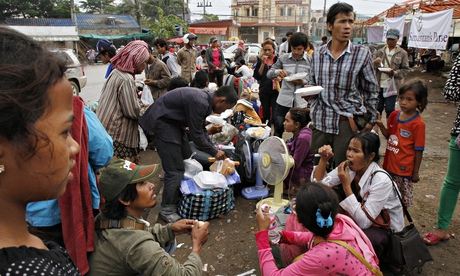Post by Sam Rainsy.

Cambodian migrant workers wait to return home at Poipet after crossing the border from Thailand. Photograph: Heng Sinith/AP
Migrants began streaming across the border last week after the Thai army spokeswoman, Sirichan Ngathong, called illegal labourers a threat to Thailand and said anyone found without papers would be arrested and deported.
Official Thai statistics show that more than 2 million documented migrant labourers work in Thailand, the vast majority of whom are Burmese, Cambodian and Lao. There are no official figures for those who work in Thailand without papers, but some activists claim that as many as 200,000 Cambodians may be working illegally – nearly the same as the number of people who have fled back to Cambodia in the past few days, according to Cambodian officials.
The exodus has sparked anger in Cambodia, where government officials have called on the Thai military – which seized power in a bloodless coup on 22 May – to assume responsibility for the migration and its consequences.
"The army has rushed to deport workers who are considered illegal without prior notice or discussion with Cambodia, or at least making contact with provinces along the borders," Cambodia's interior minister, Sar Kheng, was quoted by Reuters as saying.
"The current Thai army leadership must be held responsible for all the problems that have occurred, including the loss of life."
The migrants were likely to have been spurred on by unverified reports of killings and beatings at the hands of the Thai army, with the Cambodian Human Rights and Development Association (Adhoc) claiming to have "credible witness accounts" that nine migrants had been killed and many others beaten during deportations.
Up to eight people were also allegedly killed last weekend, when a truck transporting migrants to the border overturned.
While the Thai junta has denied any official crackdown and claims that the exodus back to Cambodia is voluntary and based on "unfounded rumours" of reprisals, it is still transporting migrants back to the Cambodian border in paid-for buses and Thai police cars. One Cambodian official also told Radio Free Asia's Khmer service that the Thai military had "instructed private companies not to accept illegal migrants".
Moun, a 27-year-old undocumented labourer who has spent the past seven years working in the construction and seafood industries in and around Bangkok, said he decided to flee after his friends warned him he was in danger.
"They said the army would arrest me if I got caught, and I was worried I would never get back home if that happened," he said as he piled his wife, baby and all their belongings – including a large toy car – on to a crowded bus filled with 200 other migrants heading for the Cambodian border town Poipet.
"I hope I can come back once the situation here gets better."
Thai officials claim workers will be permitted to return once they receive legal work permits, which they must obtain from within their home countries. But with a once-booming Thai economy now on the brink of recession, it is not clear how many "official" jobs will be open to migrant workers. Labour-intensive industries such as construction, agriculture and seafood have long largely depended on migrant labour to fill jobs that Thais have eschewed for better-paid, easier work, but the junta leader Prayuth Chan-ocha vowed last week to tighten laws regarding migrant workers and now aims to create "economic zones" along border areas, where migrants can be better controlled.
"We don't want foreign workers to be exploited by their employers," said Sihasak Phuanketkeow, Thailand's permanent secretary to the foreign ministry.
A Guardian investigation last week into the Thai fishing industry, which is largely manned by Cambodian and Burmese migrant workers, found that some labourers were being press-ganged on to Thai fishing boats, where they were forced to work as modern-day slaves under horrific conditions in a $7.3bn (£4.3bn) seafood industry that exports to the US, UK and EU.
As part of an attempt to "regulate" Thailand's migrant labour population, the junta has vowed to register all foreign labourers within one year and claims that migrant workers in the fishing industry are a "problem that must be urgently solved".
The ongoing exodus is likely to have a profound impact on the hundreds of thousands of families who depended on migrant workers' salaries back in Cambodia, where most people eke out a living as farmers and 20% of the population lives on less than $1.25 a day, according to World Bank figures.
• Additional reporting by Nat Sumon

3 comments:
It is sad but wishing for the better tomorrow. Don't take it personal and blame on Thai Junta, may be he save us from trouble when Thai red shirts and yellow going to civil war. It's a learning process how to great our own job in Cambodia.
I thought the stupid cpp said that the thai are not force deporting of the Cambodia illegal migrant workers and now blaming them? What is the truth? I guess there is no truth with the cpp! With everything.
the CPP is the responsible for this problem.... thai has the right to protect its territory from illegals whether it is khmer or laos or burmese... just as khmer has the right to protect our land from the viets and the thais...the US has been very laxed with illegal immigrants from the south... now every where you go there are spanish signs [ businesses ] americans now need to learn spanish in order to communicate with them [ instead of them learn to speak in english ] imagine Khmer has to learn vietnamese language in order to do business or interact with the Youns instead of them learning to speak khmer to talk to us while living on our land...
Post a Comment